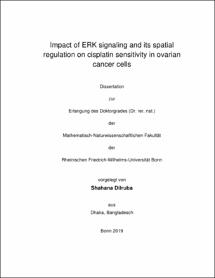Impact of ERK signaling and its spatial regulation on cisplatin sensitivity in ovarian cancer cells

Impact of ERK signaling and its spatial regulation on cisplatin sensitivity in ovarian cancer cells

| dc.contributor.advisor | Staal, Ganna Vasylivna | |
| dc.contributor.author | Dilruba, Shahana | |
| dc.date.accessioned | 2020-04-26T21:33:47Z | |
| dc.date.issued | 08.11.2019 | |
| dc.identifier.uri | https://hdl.handle.net/20.500.11811/8046 | |
| dc.description.abstract | The efficiency of the anticancer drug cisplatin in ovarian cancer is often limited by the development of cisplatin resistance. Cisplatin activates a plethora of DNA damage-related signaling pathways, which regulate the cell fate by initiating or inhibiting the cell death machineries. In this thesis extracellular signal-regulated kinase (ERK1/2) signaling pathway was investigated regarding its influence on cisplatin sensitivity. For this purpose, modulation of the pathway with a chemical inhibitor, and siRNA-mediated silencing of ERK1 and ERK2 independently, and altering the localization of the ERK1/2 by overexpression of a scaffold protein called phosphoprotein enriched in astrocytes (PEA-15) were employed. Inhibition of ERK1/2 activation by the MEK1/2 inhibitor U0126 diminished sensitivity to cisplatin in all of the three cell lines. To study if ERK1 has a predominant role over ERK2 or vice versa in determining cell death or survival, ERK1 and ERK2 were silenced independently in A2780 and A2780cis cells. This enhanced resistance to cisplatin in A2780cis cells, while A2780 cells did not show any change of cisplatin action. ERK1 silencing did not show any effect on cisplatin potency in A2780 cells. The combined results of chemical inhibition and silencing of the ERK1 and ERK2 indicated that ERK1/2 is actually required for cisplatin-mediated cell death in A2780, A2780cis and SKOV-3 cells.
PEA-15 is a ubiquitously expressed protein, capable of sequestering ERK1/2 in cytoplasm and inhibiting cell proliferation. This and other functions of PEA-15 are regulated by its phosphorylation status. In this study, the relevance of PEA-15 phosphorylation state for cisplatin cytotoxicity was examined in SKOV-3 ovarian carcinoma cells. The results indicated that overexpressing PEA-15AA (a non-phosphorylatable variant) sensitized the SKOV-3 cells to cisplatin, while phosphomimetic PEA-15DD did not have any effect on cisplatin cytotoxicity. The microarray analysis revealed the Nrf2/ARE (nuclear factor erythroid 2 related factor 2 / antioxidant response element) pathway. The relevance of this pathway was validated using retinoic acid, an inhibitor of Nrf2/ARE. These results suggest that non-phosphorylatable PEA 15AA sensitizes ovarian cancer cells to cisplatin through interfering with the Nrf2/ARE axis. | en |
| dc.language.iso | eng | |
| dc.rights | In Copyright | |
| dc.rights.uri | http://rightsstatements.org/vocab/InC/1.0/ | |
| dc.subject | Cisplatin-Empfindlichkeit | |
| dc.subject | ERK1/2-Signalisierung | |
| dc.subject | PEA-15-Phosphorylierung | |
| dc.subject | Ovarian carcinom | |
| dc.subject | Nrf2/ARE-Signalisierung | |
| dc.subject.ddc | 500 Naturwissenschaften | |
| dc.subject.ddc | 570 Biowissenschaften, Biologie | |
| dc.subject.ddc | 610 Medizin, Gesundheit | |
| dc.title | Impact of ERK signaling and its spatial regulation on cisplatin sensitivity in ovarian cancer cells | |
| dc.type | Dissertation oder Habilitation | |
| dc.publisher.name | Universitäts- und Landesbibliothek Bonn | |
| dc.publisher.location | Bonn | |
| dc.rights.accessRights | openAccess | |
| dc.identifier.urn | https://nbn-resolving.org/urn:nbn:de:hbz:5-55261 | |
| ulbbn.pubtype | Erstveröffentlichung | |
| ulbbnediss.affiliation.name | Rheinische Friedrich-Wilhelms-Universität Bonn | |
| ulbbnediss.affiliation.location | Bonn | |
| ulbbnediss.thesis.level | Dissertation | |
| ulbbnediss.dissID | 5526 | |
| ulbbnediss.date.accepted | 16.07.2019 | |
| ulbbnediss.institute | Mathematisch-Naturwissenschaftliche Fakultät : Fachgruppe Pharmazie / Pharmazeutisches Institut/Klinische Pharmazie | |
| ulbbnediss.fakultaet | Mathematisch-Naturwissenschaftliche Fakultät | |
| dc.contributor.coReferee | Jaehde, Ulrich |
Files in this item
This item appears in the following Collection(s)
-
E-Dissertationen (4378)




